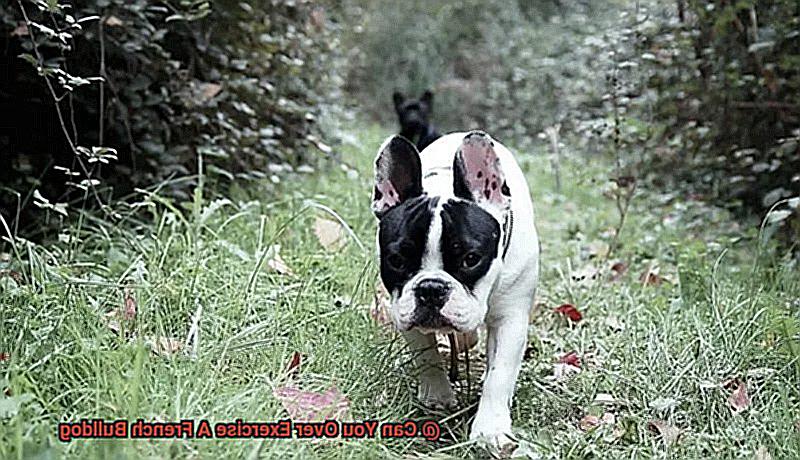Can You Over Exercise A French Bulldog?
Welcome to our blog post all about over-exercising French Bulldogs. These little cuties may be compact and full of energy, but it’s important to find the right balance when it comes to their exercise needs. We want to keep our furry friends fit and happy, but we also need to be aware that too much exercise can have negative effects.
In this post, we’ll dive into the potential risks and benefits of over-exercising French Bulldogs. We’ll talk about how excessive exercise can lead to respiratory issues and joint problems, but we’ll also highlight the positive impacts of maintaining an appropriate activity level.
But don’t worry, we won’t leave you hanging. We’ll give you some valuable tips on how to exercise your French Bulldog safely and effectively. From finding the perfect workout routine to recognizing signs of fatigue, we’ve got you covered with practical insights and expert advice.
So grab a cup of coffee, get your pup’s favorite treat ready, and join us on this educational journey. We’re here to make sure your French Bulldog stays happy, healthy, and wagging their tail with joy.
What Makes French Bulldogs Prone to Overexertion?
Contents
- 1 What Makes French Bulldogs Prone to Overexertion?
- 2 How Much Exercise Does a French Bulldog Need?
- 3 Signs of Overexertion in French Bulldogs
- 4 Tips for Exercising Your French Bulldog Safely
- 5 The Benefits of Regular Exercise for French Bulldogs
- 6 Monitoring Your Dog’s Activity Levels During Exercise
- 7 Consulting with a Veterinarian About Appropriate Exercise Routines
- 8 Potential Long-Term Damage from Overexertion in French Bulldogs
- 9 Conclusion
French Bulldogs are beloved pets known for their playful and energetic personalities. However, it is essential for owners to understand that these adorable pups have certain physical limitations that make them prone to overexertion. In this article, we will explore the factors that contribute to this vulnerability and provide tips to ensure the well-being of your French Bulldog during exercise.
Brachycephalic Syndrome:
French Bulldogs have a unique skull structure called brachycephalic syndrome, which results in a shortened muzzle and narrowed airways. This anatomical feature makes it difficult for them to breathe efficiently, especially during physical exertion. As a result, they are more prone to overexertion and can quickly become exhausted.
Heat Sensitivity:
Due to their compromised respiratory system, French Bulldogs have a low tolerance for heat. Their shortened airways make it challenging for them to regulate their body temperature effectively. Overexertion in hot weather can cause them to overheat rapidly, leading to heatstroke, which is a life-threatening condition. To prevent this, monitor their activity levels closely and provide ample rest and shade during hot weather.
Lack of Endurance:
Compared to other breeds, French Bulldogs have relatively low stamina. Their brachycephalic anatomy affects their ability to take in oxygen efficiently, limiting their endurance during physical activities. They may tire quickly and struggle to recover from strenuous exercise, making them prone to overexertion. It’s important to tailor their exercise routine accordingly and provide plenty of breaks.
Obesity:
French Bulldogs are predisposed to obesity due to genetics, lack of exercise, and overeating tendencies. Excessive weight puts additional strain on their already compromised respiratory system, making it even harder for them to breathe properly during exercise. This added stress can lead to overexertion and potential health complications. Maintaining a healthy weight through proper diet and regular exercise is crucial for their well-being.
Joint and Bone Issues:
French Bulldogs are susceptible to orthopedic conditions such as hip dysplasia and intervertebral disc disease. These conditions can cause pain and discomfort during exercise, making them more prone to overexertion. To minimize the risk, engage them in low-impact activities that don’t strain their joints and bones excessively.
Age and Fitness Level:
Just like humans, the exercise needs of French Bulldogs vary depending on their age and fitness level. Puppies require shorter, more frequent play sessions to avoid overexertion, while senior dogs may need gentle exercise routines that consider their age-related limitations.
Overenthusiastic Behavior:
French Bulldogs are known for their playful and energetic nature. However, they may push themselves beyond their physical limits due to their overenthusiastic behavior. As responsible owners, it is crucial to monitor their activity levels and intervene when necessary to prevent overexertion.
How Much Exercise Does a French Bulldog Need?
When it comes to exercise, French Bulldogs are a breed that requires a bit less than their larger counterparts. However, it’s still crucial to provide them with enough physical activity to keep them happy and healthy. In this section, we’ll explore how much exercise a French Bulldog needs, as well as the importance of monitoring their diet and health.
Exercise Needs:
On average, a French Bulldog should have around 20-30 minutes of exercise per day. This can be split into two shorter walks or play sessions to prevent them from getting too tired. Remember, they are low-energy dogs, so overexertion can lead to breathing difficulties and overheating problems. It’s recommended to avoid strenuous activities like long-distance running or intense play sessions that can cause exhaustion.
Mental Stimulation:
In addition to physical exercise, mental stimulation is also crucial for French Bulldogs. Incorporating interactive toys, puzzle games, and training sessions into their daily routine can keep their minds sharp and prevent boredom.

Monitoring Diet and Health:
French Bulldogs are prone to obesity, so it’s essential to monitor their calorie intake and ensure they receive a balanced diet. Consult with your veterinarian to determine the appropriate amount of food for your Frenchie based on their age, weight, and activity level. Regular check-ups are also important for monitoring their overall health and addressing any specific exercise limitations or health conditions they may have.
Conclusion:
While French Bulldogs may not require as much exercise as larger breeds, it’s still important to provide them with regular physical activity and mental stimulation. Remember to be mindful of their breathing difficulties and overheating issues, and avoid overexertion. By monitoring their diet and health, you can ensure that your French Bulldog remains happy, healthy, and full of energy.
Signs of Overexertion in French Bulldogs
Signs of Overexertion in French Bulldogs: How to Keep Your Frenchie Safe and Happy
French Bulldogs, or “Frenchies” as they are affectionately called, may be small in size, but they have big personalities and even bigger hearts. These adorable little dogs have unique exercise needs that owners must be mindful of to prevent overexertion and ensure their health and well-being. In this blog post, we will discuss the signs of overexertion in French Bulldogs and provide tips on how to keep them safe and happy during exercise.
Excessive Panting: A Red Flag
One of the most common signs of overexertion in French Bulldogs is excessive panting. While it’s normal for dogs to pant during exercise, if your Frenchie is panting heavily and struggling to catch their breath even after they have stopped exercising, it could be a sign that they have been overexerted. It’s important to take breaks and provide them with water to prevent dehydration.
Fatigue and Lethargy: Take It Easy
If your French Bulldog appears excessively tired and has difficulty getting up or moving around after exercise, it may be a sign that they have pushed themselves too hard. Remember, these little dogs have limited energy reserves, so it’s crucial to monitor their activity levels and allow them to rest when needed.
Muscle Tremors and Shaking: A Warning Sign
Muscle tremors or shaking can also indicate overexertion in French Bulldogs. If your dog’s muscles are trembling or shaking uncontrollably after exercise, it may be a sign that they have strained themselves. Give them a chance to recover by providing a calm and comfortable environment.
Dehydration: Keep Them Hydrated
Dehydration is another common sign of overexertion. If your French Bulldog is excessively thirsty and urinating less frequently than usual, it may be an indication that they are dehydrated from excessive exercise. Make sure to provide them with fresh water before, during, and after exercise to keep them properly hydrated.
Vomiting, Diarrhea, and Other Symptoms: Seek Veterinary Care
In severe cases of overexertion, French Bulldogs may experience vomiting or diarrhea. This can be a result of the body’s inability to cope with the physical stress it has been subjected to. Additionally, pale gums, excessive drooling, and disorientation may indicate heat exhaustion or heatstroke due to overexertion. If you notice any of these symptoms, it’s important to consult with a veterinarian for proper evaluation and treatment.
Prevention is Key
To prevent overexertion in French Bulldogs, it’s important for owners to monitor their dogs during exercise and take breaks when necessary. Keep exercise sessions short and split them into multiple sessions throughout the day to prevent exhaustion and breathing difficulties. Remember that Frenchies are low-energy dogs and don’t require as much exercise as larger breeds.
Tips for Exercising Your French Bulldog Safely
French Bulldogs are adorable and energetic companions that require regular exercise to stay healthy and happy. However, due to their unique physical characteristics, it is important to exercise them safely and avoid overexertion. In this article, we will explore some essential tips for exercising your French Bulldog safely, taking into account their respiratory issues, susceptibility to overheating, and joint limitations.
Start Slow and Gradually Increase Intensity:
When it comes to exercising your French Bulldog, it’s important to start slow and gradually increase the intensity and duration of the exercise. These dogs have a stocky build and can easily overheat or become exhausted if pushed too hard too quickly. Begin with short walks or play sessions and slowly build up from there, allowing your Frenchie time to adapt and build stamina.
Choose the Right Time:
French Bulldogs are sensitive to heat due to their brachycephalic (short-nosed) structure. Exercise your Frenchie during cooler parts of the day, such as early morning or late evening, to avoid overheating. Extreme weather conditions can be dangerous for them, so it’s best to avoid exercising in very hot or cold temperatures.
Provide Plenty of Water Breaks:

Hydration is key when exercising any dog, but it is especially important for French Bulldogs. Due to their short snouts, they have a harder time breathing and can easily become dehydrated. Always carry water with you during exercise and offer frequent water breaks to ensure your Frenchie stays hydrated.
Avoid High-Impact Activities:
French Bulldogs are prone to joint and bone issues, so it is best to avoid high-impact activities that could put strain on their joints. Instead, opt for low-impact exercises like swimming or gentle play sessions that won’t put excessive stress on their bodies.
Monitor Breathing and Energy Levels:
Keep a close eye on your Frenchie’s breathing and energy levels during exercise. If you notice excessive panting, wheezing, or struggling to catch their breath, it’s a sign that they may be overexerting themselves. Additionally, if your Frenchie seems lethargic or excessively tired after exercise, it could indicate that they have been pushed too far. Always listen to your dog’s cues and adjust the intensity accordingly.
The Benefits of Regular Exercise for French Bulldogs
Regular exercise is crucial for maintaining the overall health and well-being of French Bulldogs. In this article, we will explore the numerous benefits that regular exercise provides for these lovable companions. From preventing obesity to improving cardiovascular health, exercise plays a vital role in keeping French Bulldogs happy and thriving.
Weight Management:
French Bulldogs are prone to obesity, making regular exercise essential for preventing weight gain and maintaining a healthy weight. Obesity can lead to various health issues, including joint problems, heart disease, and decreased lifespan. Exercise helps burn calories and keeps their metabolism active, promoting weight control.
Muscle and Joint Health:
Regular exercise strengthens the muscles and joints of French Bulldogs, improving their mobility and reducing the risk of common health issues such as hip dysplasia. Engaging in activities like walking, running, and playing fetch helps maintain healthy muscle tone and promotes joint flexibility.
Cardiovascular Health:
Exercise plays a significant role in improving cardiovascular health in French Bulldogs. By engaging in physical activity, their heart and lungs become stronger, enhancing blood circulation throughout the body. Improved cardiovascular health reduces the risk of heart disease and ensures optimal oxygen supply to all organs.
Mental Stimulation:
Regular exercise provides mental stimulation for French Bulldogs, reducing boredom and destructive behaviors. Activities like puzzle toys, agility training, and obedience exercises challenge their minds and keep them mentally sharp. Mental stimulation is essential for their overall well-being.
Digestive Health:
Exercise promotes good digestion and regular bowel movements in French Bulldogs. It helps prevent constipation and other digestive issues by keeping their gut active and promoting healthy digestion. Regular exercise encourages a healthy metabolism.
Energy Regulation:

Regular exercise helps regulate energy levels in French Bulldogs. It provides an outlet for their pent-up energy, preventing restlessness and hyperactivity indoors. A tired dog is a happy dog. Additionally, exercise promotes better sleep patterns, ensuring they rest well and wake up refreshed.
Socialization:
Exercise offers opportunities for French Bulldogs to interact with other dogs and people, promoting socialization skills. Dog parks, group walks, and playdates allow them to develop positive social behaviors and build confidence in various environments. Socialization is crucial for their overall well-being.
Bonding:
Regular exercise strengthens the bond between French Bulldogs and their owners. Engaging in physical activities together creates shared experiences and quality time spent together. This bond enhances trust, companionship, and mutual understanding.
Stress Reduction:
Exercise plays a role in reducing anxiety and stress in French Bulldogs. Physical activity releases endorphins, which are natural stress-relieving hormones. Regular exercise provides an outlet for them to release excess energy, leading to calmer behavior and improved mental health.
Monitoring Your Dog’s Activity Levels During Exercise
One important aspect of their well-being is monitoring their activity levels during exercise. In this blog post, we’ll dive deep into the topic and provide you with expert tips on how to ensure your French Bulldog’s safety and enjoyment during physical activities. So, grab a cup of coffee, sit back, and let’s get started.
The Importance of Monitoring Activity Levels:
French Bulldogs may be small in size, but they have certain limitations when it comes to physical exertion. Their brachycephalic (short-nosed) anatomy makes them prone to respiratory issues and overheating. Therefore, it’s crucial to monitor their activity levels to prevent overexertion and potential health risks.
Pay Attention to Breathing:
One of the easiest ways to monitor your French Bulldog’s activity levels is by observing their breathing. Excessive panting or difficulty catching their breath may indicate that they’re pushing themselves too hard. If you notice these signs, it’s time to take a break and let them catch their breath.
Keep an Eye on Heart Rate:
While measuring your dog’s heart rate during exercise might not be practical for everyone, there are other signs you can look out for. If your French Bulldog’s heart rate seems elevated for an extended period or if they show signs of fatigue, it’s a clear indication that they need a rest.
Observe Behavior:
Dogs are notorious for pushing themselves beyond their limits, especially when they’re having fun or trying to keep up with other dogs. It’s essential to pay attention to signs of exhaustion such as excessive drooling, stumbling, or reluctance to continue exercising. If you notice any of these behaviors, it’s time to give them a break and hydrate.
Environmental Considerations:
French Bulldogs are particularly sensitive to hot and humid weather due to their compromised respiratory systems. Overheating can lead to heatstroke, which is life-threatening. Exercise them during cooler times of the day, provide plenty of water breaks, and avoid strenuous activities in extreme temperatures.
Monitor Recovery:
After exercise, your French Bulldog should recover relatively quickly. If they seem excessively tired or take an unusually long time to recover, it may indicate that they have been overexerted. Give them ample rest and consult with your veterinarian if you’re concerned about their recovery time.
Consulting with a Veterinarian About Appropriate Exercise Routines
When it comes to keeping your French Bulldog fit and healthy, it’s important to consult with a veterinarian. These furry little bundles of joy have specific needs and limitations that must be considered when creating an exercise routine. Let’s dive into the importance of seeking professional advice and how it can benefit your beloved Frenchie.
Expert Knowledge and Personalized Recommendations
Veterinarians are like the personal trainers for our furry friends. They have the expertise and knowledge about the specific needs and limitations of French Bulldogs. By consulting with a veterinarian, you’ll get personalized recommendations based on factors such as age, health condition, and individual temperament. After all, not all Frenchies are created equal.
Tailored Exercise Plan for Optimal Health
Just like humans, each dog is unique, and what works for one may not work for another. A veterinarian will assess your French Bulldog’s overall health and take into consideration any pre-existing conditions or breed-specific concerns. They’ll also consider their energy level and activity requirements to develop an exercise plan that meets their needs without risking overexertion or injury.
Guidance on Duration, Intensity, and Frequency
Ever wonder how long should you walk your Frenchie or how intense their play sessions should be? Veterinarians can provide guidance on the duration, intensity, and frequency of exercise that is appropriate for a French Bulldog. They may recommend a combination of activities such as walks, playtime, mental stimulation exercises, and even specific training exercises to keep your Frenchie physically and mentally stimulated.
Adjustments as Your Frenchie Ages
As your Frenchie ages, their exercise needs may change. Regular check-ups with a veterinarian are essential to monitor their progress and ensure that the exercise routine remains appropriate and beneficial for their overall well-being. A veterinarian can advise on when to modify or adjust the exercise routine to accommodate any age-related changes or health issues that may arise.
Potential Long-Term Damage from Overexertion in French Bulldogs
French Bulldogs, with their adorable squished faces and compact bodies, have stolen the hearts of dog lovers around the world. But behind their cute appearance lies a vulnerability to potential long-term damage from overexertion. As a responsible French Bulldog owner, it’s essential to be aware of the risks and take steps to protect your furry friend’s well-being.
Respiratory Problems: Handle with Care
French Bulldogs are brachycephalic, meaning they have a shortened skull and compressed airways. This anatomical feature makes them more susceptible to respiratory issues. Excessive exercise can further strain their already compromised respiratory system, leading to difficulty breathing, wheezing, and even collapse. It’s crucial to keep a close eye on their breathing during exercise and provide plenty of breaks and water to prevent overheating.
Heatstroke: A Deadly Threat
French Bulldogs are highly sensitive to heat and can quickly succumb to heatstroke if not properly monitored during exercise. Heatstroke can cause organ damage, seizures, and even death if not treated promptly. Protect your Frenchie by avoiding intense exercise during hot weather, providing shade and cooling options, and ensuring they have access to water at all times.
Joint and Musculoskeletal Issues: Exercise in Moderation
While French Bulldogs may be muscular, their bodies are not built for intense physical activity. Overexertion can strain their joints, leading to conditions like hip dysplasia, patellar luxation, and arthritis. These conditions can cause chronic pain and mobility issues for your Frenchie in the long run. Stick to moderate exercise routines that don’t put excessive stress on their bodies.
Injuries: Less is More
French Bulldogs have a stocky build with short legs, making them more prone to injuries when subjected to high-impact activities. Avoid activities that involve jumping or sudden twists that could put excessive stress on their bodies. Remember, less is more when it comes to protecting your Frenchie from potential injuries.
Psychological Effects: Mind Over Matter
Overexertion can have psychological effects on French Bulldogs, leading to anxiety, restlessness, or hyperactivity. Pushing them beyond their limits can leave them overly tired or stressed, negatively impacting their overall well-being. Pay attention to their body language and behavior during exercise and provide them with the breaks and rest they need to stay happy and mentally balanced.
1SNPOm4LERc” >
Conclusion
It is crucial to understand that over-exercising a French Bulldog can have serious consequences for their health.
These adorable little dogs may seem energetic and playful, but their unique anatomy and respiratory system make them more susceptible to overheating and exhaustion. Pushing them beyond their limits can lead to heatstroke, dehydration, joint problems, and even heart issues.
It’s important to strike a balance between exercise and rest, ensuring they get enough physical activity without pushing them too far.




